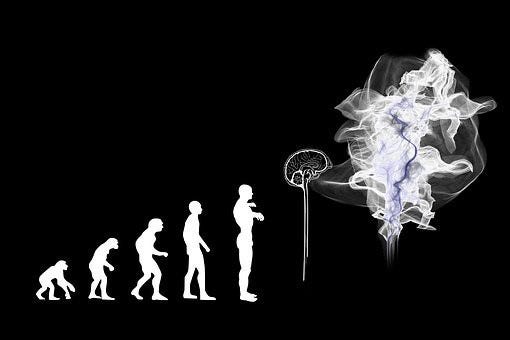

This follows on from part 1, which it may be helpful to have read, in order to put what follows in context. It is part of a conversation on Medium.com between myself and Mitchell Diamond, author of Darwin’s Apple: The Evolutionary Biology of Religion. He has responded to part 1 (click here), so this is my further response, which includes his main points.
He unsurprisingly identifies himself as “a materialist, empiricist, rationalist”, as evolutionary biologists tend to be, and says that his writing is directed “to those who embrace such an idea. For those who don’t agree, don’t bother reading my writings”. He would therefore seem to be only interested in establishing a clique of fellow believers, without having to consider any flaws in their way of thinking.
As I’ve argued frequently in the past, as have others better qualified than me, Darwinian evolutionary theories appeal to rational, materialist atheists precisely because they reinforce their philosophy. The most famous example is Richard Dawkins, who said that Darwin enabled him to become an “intellectually fulfilled atheist”. His desire to be an atheist overrode any considerations of how credible the theory was. This is not how science should proceed. It should start from the evidence, the ‘facts’ insofar as these can be ascertained, and then try to derive theories and a worldview from them. One should not start from a preconceived philosophy, and then only contemplate theories which fit it.
In part 1 I said that “evolutionary biologists are, on the whole, fairly clueless about the implications of quantum physics for our understanding of reality”. Diamond agrees that he doesn’t know much, if anything, about this, and asks me whether I understand. I have not even one basic qualification in physics, and am baffled, like most people, by the equations and mathematics. I can, however, understand when physicists write in plain English about the implications of their findings. For example:
- that matter, as we perceive it, is an illusion (Sir Arthur Eddington and many others) — which is an interesting thought for materialists to contemplate.
- that the universe appears like “a great thought” (Sir James Jeans) — who or what is doing the thinking is a great question for atheists.
- that the apparently material universe emerges from other levels of reality (David Bohm).
I can also understand Bruce Lipton when he describes how he started as a biologist with little interest in physics, but then realised the error of his ways. He says that “quantum physics is relevant to biology and that biologists are committing a glaring, scientific error by ignoring its laws”. “We biologists almost universally rely on the outmoded, albeit tidier, Newtonian version of how the world works”¹. (‘Newtonian’ here obviously has some connection with a “materialist, empiricist, rationalist” worldview.) It is therefore fairly obvious why Darwinian evolutionary biologists choose to remain oblivious to quantum physics; it propels a torpedo through the philosophy of materialism, their close ally.
Continuing on that theme, it is also worth noting that modern physicists are often critical of Darwinian evolutionary theory, because of its inadequacy, for example Danah Zohar in The Quantum Self, Paul Davies in The Cosmic Blueprint, and Amit Goswami in Creative Evolution.
There are many other scientists who find Darwinian theories inadequate. For example, check out www.thethirdwayofevolution.com — I especially like the ideas of Stephen Talbott.
As Diamond has revealed, he is only writing for those who already agree with him. This reminds me of the expression about those who cannot see the forest for the trees. It’s possible to become so fixated by some small area of interest, that one fails to see the bigger picture. That is why we should consult science as a whole, and other disciplines like philosophy, not focus on one specialisation, if we want to understand reality. If I were engaged in a serious intellectual project, a major part of my life, I would want to make sure that I was starting on secure intellectual foundations, not on possible illusions. Diamond seems to think otherwise.
He also says: “The notion that the scientific method may not be valid because it’s a recent invention is silly”, which isn’t what I said. What I actually wrote was that “the scientific worldview described above has emerged only in recent times… It is reasonable to ask therefore whether modern science is as true as its advocates believe it to be, or whether it is a temporary aberration”. He has failed to notice that I was criticising the scientific worldview (of materialism), not the scientific method, about which I have no criticisms at all. I only criticise its misapplication, when the claim is made that only materialist science via the scientific method can explain the nature of reality. Materialists often get confused between the worldview and the method because they think that they are more or less synonymous.
On the same theme Diamond says that I want to “refute the scientific worldview”. I did use that phrase, but he failed to notice my quote marks around the word ‘scientific’. To my mind this suggested that the so-called scientific worldview was not really scientific in the proper sense of the word, rather is often falsely equated with rational materialism, i.e. a philosophical viewpoint. Again, I was trying to point out that for scientific thinkers like Diamond ‘scientific’ and ‘materialist’ are more or less synonyms, which is an error.
He then falls back on the silly argument that because science and the scientific method has brought us wonderful developments in medicine and technology, this somehow validates his materialist worldview. As he says, it is just the part of science that rejects religion (by which we mean a spiritual worldview, not any particular religion) that is the issue. Wonderful developments in medicine and technology have nothing whatsoever to do with the question we were originally discussing, the truth or otherwise of religious/spiritual beliefs.
My opening observation in my previous response was that he was presenting what was merely his opinion as a fact: “God(s) are a creation of the human mind.” He agrees this is the case, but says that I have misrepresented his meaning by extracting this one phrase from the relevant paragraph. I assume he is referring to “ I’m not against people having these beliefs…”. Since he thinks these beliefs are illusions, it’s hard to see how that makes any difference. In everything I write I am careful not to present what I believe as facts; I don’t see why others can’t do the same.
This time he does concede that his conclusion is merely his opinion, that “the human predilection for religion is real and is an evolutionary adaptation”. He is, however, completely convinced that this opinion is correct, and will be proved beyond doubt at some point in the future. This is hardly surprising, given that he is a dedicated “materialist, empiricist, rationalist”. As he is only interested in communicating with those who agree with him, he will remain oblivious to all the scientific arguments against what he believes.
===========================================================================================
Footnote:
1. The Biology of Belief, Hay House, 2008, see the whole of chapter 4, quote p69